|
|
Chapter Eight: The Big Break (1980)
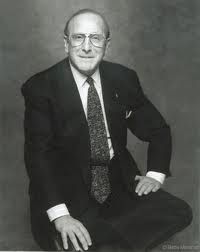
Clive Davis - Arista
Clive Davis waited for the new year, and without Air Supply’s knowledge, released ‘Lost In Love’ in January, 1980. Arista’s position was that they would wait for reaction to the single, and at the first hint of the record taking off they would pick up the option on the album.
“I put on the credits for ‘Lost In Love’ that is was produced by Robie Porter, Rick Chertoff and the original producer Charles Fisher,” said Robie Porter. “I thought about what Clive did, and it was not much, but I put him down as the executive producer, which had never been used at that time on any record anywhere in the world. The record came out and radio stations thought that Clive Davis had produced it. They thought that Air Supply must really be something. A couple weeks later, Clive called me and said, ‘You had better get into the studio to finish that album because this record is going into Billboard with a bullet, and it’s going to number one.’ I didn’t tell Clive that there was no band at this point. I brought Graham back from England and put everyone in the studio. Over the coarse of the next 55 days, which was significant for me, we put the album together.”
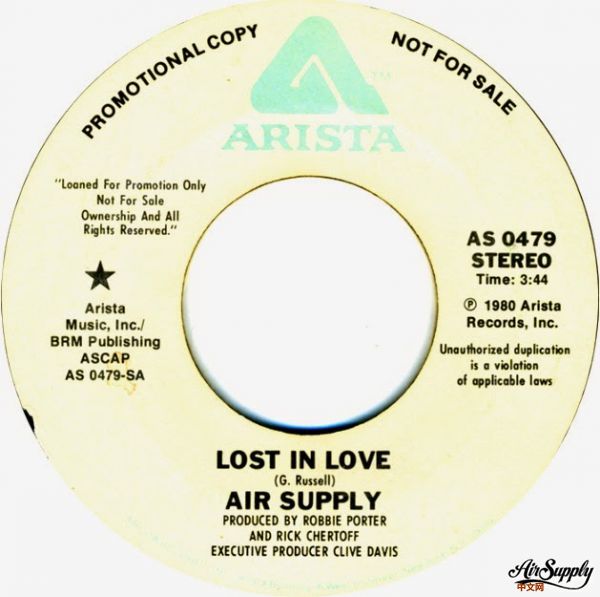
'Lost In Love' U.S. Promo, Jan. '80
“‘Lost In Love’ was one of Arista’s first single releases of the Eighties,” said Clive Davis in his book titled The Soundtrack Of My Life. “We sent it to radio in January 1980, and since we didn’t have any new material for the B-side of the commercial single, we used a cut (‘I Don’t Wanna Lose You’) from a previous Australian Air Supply album. Things began happening very fast. The single took off, and was rapidly climbing the charts when we knew we had to exercise the option on the album and get that moving. Here’s where strategy really comes into play, and illustrates how a record company can maximize the potential of a given artist or album. I suppose we could have taken some tracks that had already been released in Australia, added the new mix of ‘Lost In Love,’ and slapped together an album to take advantage of the single’s momentum. And that album would have done all right. But I knew that by recording at least a couple of new songs that had the potential to be hits, we would extend the life of Air Supply, identify them with more than the one song (thereby removing them from the ever-growing list of one-hit wonders), and sell many times what an album with only ‘Lost In Love’ to drive it could. Perhaps some labels would have been happy to pick up ‘Lost In Love’ as a single master, celebrated when the song became a smash hit, taken shortcuts to exploit the single, and never mined the longer-term potential of Air Supply. At Arista, we just never had the luxury of being able to hit and run. We needed to maximize each and every release and build artists who could sell year after year. We relied on current product; we couldn’t let up for a moment because we never had catalog sales to help pay the bills.”
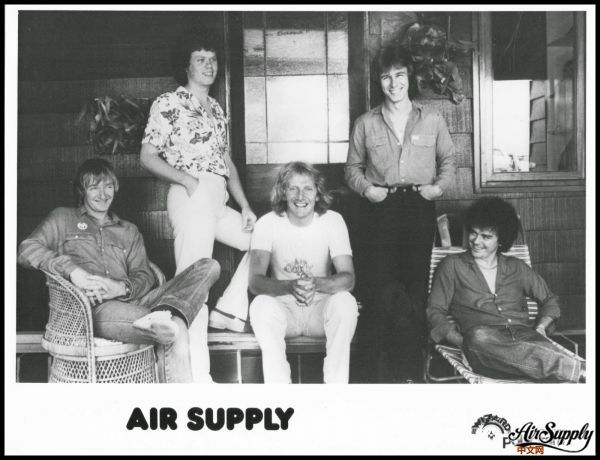
Canadian Press Photo - Wizard/Polygram 1980
“In January 1980, I went to a music industry conference in the South of France to try to stir up some interest, make contacts - anything,” said Graham. The conference was Midem, the music-business festival held annually in Cannes. It was considered one of the most important events for those who wanted to brush shoulders with people in the music business. The 1980 edition of Midem began on January 21, and popular topics included disco, music piracy, and the acquisition of independents in America by major labels. “I stayed in a really grotty hotel, got food poisoning and lost twelve pounds in three days,” recalls Graham. “I’d never felt worse. I didn’t know a soul, didn’t speak the language, and was being sick all the time. Then I picked up a record magazine (American trade publication Record World) and saw ‘Lost In Love’ on the cover, and assumed someone else had written a song with the same name. Then I saw the name Air Supply and I nearly died. The record company released it in America without telling us, and it was predicted to be a hit. I called Clive Davis, without knowing who he was. I got a phone number and called him in New York at the Arista office. I told him who I was, and asked if it was all real. He said, ‘What are you doing there? You should be in Australia recording an album. ‘Lost In Love’ is going to go all the way to the top!’”
“The Australian version [of ‘Lost In Love’] is quite different from the American version,” said Graham. “It’s not as lush, and there aren’t background singers in back going ‘Lost in love and I don’t know much.’ They aren’t on the Australian version. That’s just Russell [doing all the background vocals]. When Clive Davis heard the track he said, ‘I want to put some female voices on.’ He wanted to make it a little more catchy. If you listen to the Australian version with headphones, you can actually hear us talking in the background of the track. That is not on the American version. They took that off.”
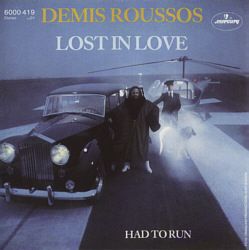
Demis Roussos 'Lost In Love'
There was good reason to think that someone else had released ‘Lost In Love’ because Air Supply had licensed the song to Greek-born singer Demis Roussos in 1979. Roussos fell in love with the song during a visit to Australia, and he brought a copy of the single back with him to Europe. He recorded his own version as a duet with Florence Warner in January 1980, and released it throughout Europe in April, three months after Air Supply released their remixed version. Because of Air Supply’s success with the song, the Roussos version was not released as a single in North America or Australia. But it was a big hit in Europe, where it reached #2 in the Netherlands and #3 in Belgium.
Graham phoned Russell to tell him that ‘Lost In Love’ was quickly climbing the charts in America, then took a ferry to London, and then a flight to New York, and then to Australia. He was flat broke and was forced to take a flight from London that departed at 5:00 a.m., because airfare was much cheaper. Upon arrival in New York, Clive Davis told Graham that Arista still needed to work out the details for the album, but that the band needed to get back to Australia immediately to record more songs. After which, they would return to the States for additional recording, and ultimately the album launch. “I went to New York to meet Clive for the first time,” said Graham. “I sat in his office and I was almost shaking because I knew how powerful he was. We had lunch and he asked me if I had any other songs, because he hadn’t heard anything else. I told him that I had written an entire album. So he told me to go back [to Australia] to record it.”
In February, Air Supply and producer Robie Porter recorded new songs at Paradise Studios in Sydney’s Woolloomooloo. Paradise Studios was a state-of-the-art facility built in 1979. It was here that Air Supply recorded such songs as ‘Every Woman In The World,’ ‘I Can’t Get Excited,’ ‘My Best Friend,’ ‘Chances’ and ‘Having You Near Me.’ The band included David Moyse, Ralph Cooper, Criston Barker and Frank Esler-Smith as a session keyboardist.
Arista and Wizard Records inked a long-term worldwide contract for Air Supply worth $1.5 million, and called for eight albums. As outlined in the contract, all records released in Australia, South Africa and New Zealand would be sold under the Wizard/Big Time label, and distributed by EMI. All Canadian sales would be handled by Wizard Records with Polygram distributing. In Japan, Arista licensed Nippon Phonogram to manufacture and distribute Air Supply’s music. In the U.S. and all other territories, Air Supply was an exclusive artist with Arista Records.
Arista underestimated how quickly ‘Lost In Love’ would climb the charts, and how well it would sell. Within one month the single sold 200,000 copies. But Arista was now in a highly disadvantageous position, because they knew it might take several months to complete the album. ‘Lost In Love’ first appeared on Record World music chart, before debuting at #90 on Cash Box for the week ending February 9. It opened on Billboard at #127, and reached the Top 40 on March 8. Seven days later it was in the Top 10.
“People say we’re losing thousands of album sales a day,” said Russell. “I hope that’s not true, but there’s no way of telling. There’s nothing we can do about it anyway. I’m not surprised that the singles done as well as it has at all, because it’s a great song. I’m surprised that it’s done it so quickly.” An Australian newspaper asked Russell what it would be worth if ‘Lost In Love’ became a number one hit in the U.S. “It’s impossible to say,” he replied. “But Melissa Manchester has had only one number one hit in the United States, and last year she made two million dollars just singing in Las Vegas.” When asked what he might do with new-found wealth, he replied, “I want to buy a house. I’m not interested in a fancy car, just a house. Any money I’ve been putting aside will go towards that.”
Roy Lott, an employee at Arista Records in the early 80s, was assigned to Air Supply during the bands early days with Arista. Lott worked closely with Clive Davis, and remembers how firm the Arista President could be when he wanted something done. “After the hit ‘Lost In Love,’” said Lott, “Clive decided to do an album, and although they already had recorded music in their homeland, more songs were needed for the U.S. release. It was the Wednesday before Easter, and I had to get them out of Australia, and into the U.S. by Friday. Easter Sunday (April 6, 1980) is a big holiday in Australia. Subsequently, people take time off right before the weekend, and Monday is also a holiday. We needed to get an album recorded immediately. But I was having a hard time getting them their passport. I ended up getting them into Canada because it was easier to get passport clearance. If I didn’t get it done that Wednesday, I wouldn’t have been able to do anything for the whole next week. Clive told me, “Every week you don’t get them into the U.S., you’re losing $1 million.”
When Russell and Graham arrived in the U.S. they were amazed how well ‘Lost In Love’ was doing on the charts. It hit #1 on the Billboard Adult Contemporary chart on April 19th, and held that position for 6 weeks. In London, the Demis Roussos cover of ‘Lost In Love’ had been dropped from playlists in favour of the Air Supply original. In Japan, ‘Lost In Love’ was #29 first week in. Russell remembers how it felt to hear their music on American radio for the first time. “We were both over here, and I was in a car somewhere, I think on Sunset Blvd., and I heard ‘Lost In Love’ on the radio. It was a feeling you can’t describe to anyone. It was just so much joy. I wanted to stop the car and run around in circles.”
Air Supply returned to the studio after Easter weekend to complete the album. Robie Porter admired one of Graham’s compositions titled, ‘All Out Of Love,’ which Graham wrote in Adelaide for his Sherwood project. But Porter was concerned with the songs lyrics. He told Graham that the lyric, ‘I’m all out of love, I want to arrest you,’ did not make sense, and that they couldn’t use the words ‘I want to arrest you’ in a song. Graham fought everyone all the way up to Clive Davis to maintain the original lyric, but Davis agreed with Porter. He asked Porter to re-write the lyric because he loved the song, but he knew it could not be released with the current lyric. Porter approached Graham once again and this time Graham agreed. “So we changed probably half of the whole thing. Graham hit the roof and went nuts,” said Porter.
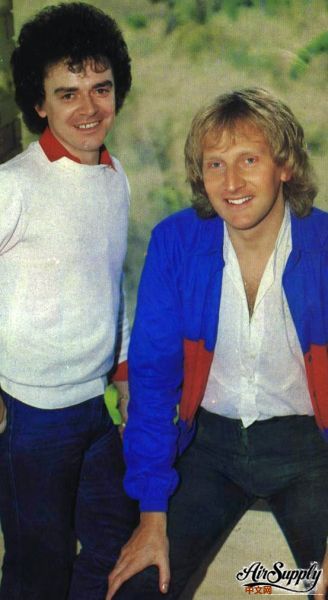
Davis’ recollection of the writing process for ‘All Out Of Love’ was different from Porter’s, and this later resulted in a legal dispute. According to Davis, it was he who changed the lyrics, not Porter. “I did play an unusual personal role in the album’s second single,” said Davis. “Graham had written a lovely song called ‘All Out Of Love,’ but I knew the lyrics had to be changed. As I recall, one of the lines was ‘I’m all out of love, I want to arrest you.’ I explained that that line wouldn’t work, and I pointed out other lines that needed to be rewritten. I then sat down and wrote the revisions myself. So for the first and only time, I took credit as co-writer on a song. Thank goodness it became a huge hit, otherwise I never would have heard the end of it from artists and writers that the sole example of my songwriting skills resulted in a stiff. As it turned out, ‘All Out Of Love’ did even better on the charts than ‘Lost In Love.’ It peaked at number two. I came that close to co-writing a number-one hit!”
Tommy Emmanuel recorded with Air Supply at Paradise Studios in February. “They recorded ‘Lost In Love’ and then they re-recorded it again later,” said Emmanuel. “I played on the first and second version. The first version was a favour, a demo. Then they got their record deal with Clive Davis and, bang, they had millions of dollars to spend on this album. They had a big producer from America (Harry Maslin), and Robie Porter, who actually produced my first three albums. I played on ‘Every Woman In The World,’ ‘All Out Of Love,’ ‘American Hearts’ and all that stuff on that whole album, and I got a credit that said ‘Additional Guitar, Tommy Emmanuel.’ I did all the guitars on that.”
Air Supply worked feverishly to complete the new album, including the vocals for ‘All Out Of Love.’ They intended to have Russell sing the entire song, but he couldn’t remember the lyrics. “It became instantly obvious that the way to record it was to have Graham sing the verses and then I would sing the choruses,” said Russell. When they heard the final recording, everyone knew they had another huge hit on their hands. Davis brought in talented American producer Harry Maslin to complete the album, and it was quickly mixed at Larrabee Studios in Los Angeles.
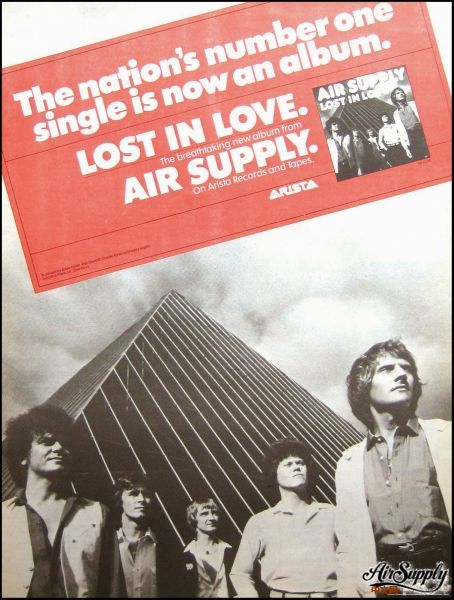
“We were camped up in Beverly Hills at the producers house (Robie Porter),” said Graham, “and he wouldn’t let us go out because we were singing ‘All Out Of Love’ in the ensuing days. The first time I heard the finished song was at Robie’s house and it just sounded so good. I just knew that it was going to pop, and Clive knew it too. He said, ‘Get ready because it’s going to be a long ride.’”
Before Air Supply returned to Australia in late April, management talked about the possibility of a short tour of the States with Melissa Manchester in July, with the intention of releasing a second single by then. Negotiations had begun for a six week tour of American colleges in October, which was to coincide with the release of Air Supply’s second Arista album. Most of the college gigs would feature Air Supply as the headliner, and a few would be on a shared top-bill basis. Names being tossed around included Pablo Cruise and Rupert Holmes.
Air Supply’s career in the U.S. was off to a promising start compared to the bands first attempt in 1977, but their progress in Australia was still in doubt. “It’ll be interesting to see what happens when we go back,” said Russell. “I think we’re in good shape there but you never know. If the press and the people there have a bad attitude towards us, we’re ready for it. We’re used to that silliness now.”
After returning to Australia, Graham and his 29-year-old girlfriend, Chrissie, escaped the city for a ranch in Avoca Beach on the Central Coast. Russell got married to Dianna (Di) O’Neill on May 24th, his second marriage. They moved into a two-bedroom apartment in the Eastern suburbs of Sydney, where Russell drove Di to work each morning in their yellow Mini. Di worked for Wizard Records in the promotions department. At this point, everyone in Air Supply were content living in Australia. “We would rather follow the Little River Band and continue to live in Australia,” said Russell. “We can still fulfill touring and promotional engagements, and not jeopardize our careers if we arrange things well enough.”

Celebrity Tattle Tales - March, 1980
Russell and Di were contestants on the Australian television game show Celebrity Tattle Tales, which was modeled after the popular American version called Tattletales. The show’s premise involved questions asked about celebrity couples’ personal lives, with one member of each couple on the main set and the other isolated backstage.
In late April, the highly anticipated album, entitled ‘Lost In Love,’ was released in the States, and a few weeks later in Australia. It entered the American Billboard album charts at #106, and a week later it was #68. But the album stalled at #47 in late May. It was not until Air Supply released the second single, ‘All Out Of Love,’ that the album vaulted towards the top 20. It was very risky, and not common for a band to release consecutive ballads. Most record labels believed that this could represent death for a new act. But Arista desperately wanted another hit single, and they knew that ‘All Out Of Love’ was going to be huge.
In June, ‘All Out Of Love’ debuted on Billboard Hot 100 at #71, and reached the #2 position in its 14th week (September 13, 1980). It was selling between 20,000 and 30,000 copies a week in the States, and spent 4 weeks at #2. On September 6, ‘All Out Of Love’ hit #1 on Record World singles chart. On August 30, Casey Kasem of American Top 40 crowned Russell with the distinction of holding the final note of the song for 16.2 seconds, an unofficial record for a Top 10 song in pop music. Three years later, singer Freddy Curci from Canadian rock band Sheriff broke this record when he held a note for close to 30 seconds on the hit single ‘When I’m With You.’
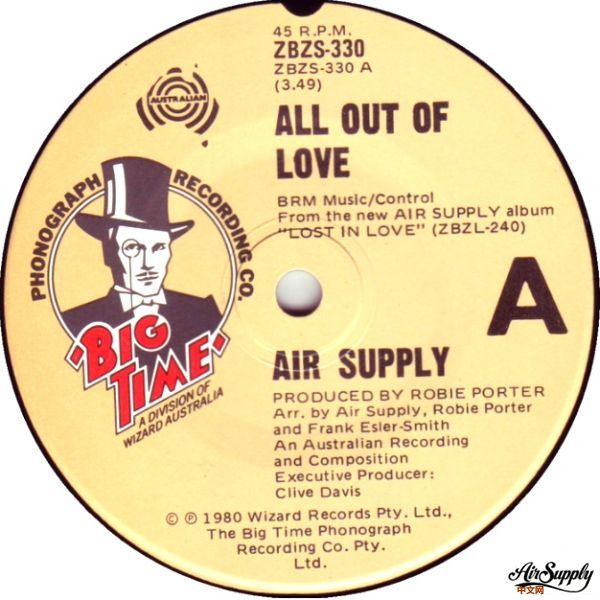
'All Out Of Love' - Australian Release
While ‘All Out Of Love’ raced up the American charts, Air Supply found themselves embroiled in two separate legal battles in the Melbourne and Sydney Supreme Courts. Firstly, Graham and BRM Music (Bestall & Reynolds publishing company) slapped an injunction on EMI Australia, preventing them from pressing and distributing any copies of the album ‘Lost In Love’ and the single ‘All Out Of Love.’ The legal action was brought forward because producer Robie Porter, in claiming he co-wrote the single, had his name added to the credits on the Australian pressing. But Graham and BRM disputed that Porter had any involvement in the writing of the song. The American pressing included Clive Davis as co-writer. EMI’s national promotions manager, Rob Walker, confirmed that no more copies of ‘All Out Of Love’ or the album would be released until the legal suit was resolved. Walker said, “As far as I’m concerned, Air Supply’s new single has been doing very well in this country since its release, and it looks like being a big hit for them. It seems to me they’re cutting off their noses to spite their faces by injuncting us. If the band proceeds with this action it may lose them a hit, and that’s something they can’t afford at the moment.” ‘All Out Of Love’ was sitting at #36 with a bullet on the Australian national charts. The Sydney Supreme Court ruled in favour of EMI, giving them the green light to press and distribute the new single and album.
The second case, heard in Melbourne’s Supreme Court, revolved around an internal dispute between Robie Porter’s Wizard Records and Big Time Recording Company which was 50% owned by Porter and 50% by Air Supply’s management team, Bestall & Reynolds. Porter had issued an ex-parte injunction against Big Time, because Porter was no longer to produce Air Supply on any upcoming records in America. Future recording sessions were to be produced by Harry Maslin. Details of the case were covered in a tight veil of secrecy, with neither side prepared to discuss it with the media. The relationship between Robie Porter and Air Supply’s management team deteriorated, and Russell’s wife, Di Hitchcock, resigned from Wizard Records. She later got a job in the promotions department of radio station 2MMM FM. Since the court battles commenced, Air Supply flat-out refused to promote ‘All Out Of Love’ or the album in Australia, and declined almost all requests for interviews.
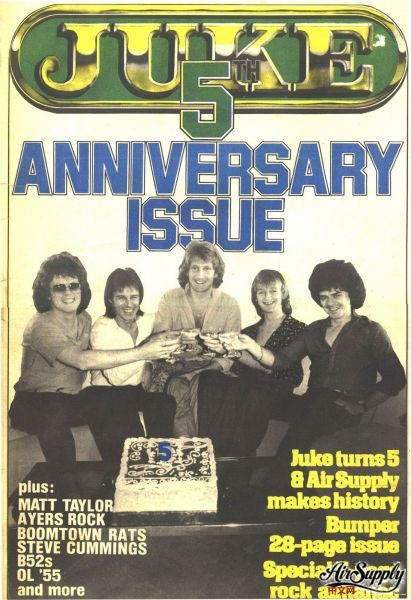
Juke - May 24, 1980
Air Supply agreed to feature on the cover of Juke’s special 28-page fifth birthday issue. Melbourne-based Juke emerged from humble beginnings in 1975 to become one of Australia’s most respected music trade publications. By 1980 they were Australia’s only weekly music newspaper. Juke could certainly relate to Air Supply because cynics had told them both that they would never succeed.
Juke’s main competitor was Sydney-based RAM magazine. RAM supported Air Supply in the beginning, but their relationship soured after RAM accused them of producing overly commercial music for the sole purpose of making money. In all fairness, Air Supply gave them ammunition to fuel the negativity. Graham was quoted in a 1978 issue of RAM saying; “We’re a commercial band to the degree that we’ve got something to sell. It’s like soap powder. It’s different but it’s similar. Like if I was trying to sell soap powder on the streets I’d have a commercial product. We’ve got a product to sell, but it’s not soap powder - it’s an art. It’s the same thing but it’s a different product. We’re trying to sell something.”
Often it was not the members of Air Supply that created friction with the Australian media, but their management team. An editor with Juke magazine recalled his first experience with the band; “My first direct contact with Air Supply was in 1978 when I conceived a two hour television documentary called Australian Music To The World. The Band’s management also managed Barry Humphries, who we wanted on the show. Their management company said we could have Humphries if we included Air Supply in the programme. I thought that suggestion reeked of blackmail, and as I hadn’t included Air Supply in the original script, I was more than a little pissed off. Unfortunately, and isn’t hindsight a wonderful thing, I blamed Air Supply instead of their management company. Since then, I have been biased against Air Supply, thinking they were getting feet in the door via the talents of other people. Of coarse, I was wrong. Now, I guess it would be considered good management. Anyway, time has proven that Air Supply well and truly deserved to be part of that television show, even if their method used to appear was questionable.”

Netherlands U.S. Brazil Japan
‘All Out Of Love’ was released in France and Canada in September, and hit highs of #3 and #1 respectively. It was also a hit in the U.K., where it peaked at #11 and charted for 11 weeks. In Australia, radio ignored ‘All Out Of Love’ for several months. After it entered the Top 10 in America, it became a matter of ‘better late than never’ for Australian radio programmers. When it got significant radio play in September, the Australian record-buying public acted accordingly and the song reached #9 on the Kent Music Report. An impressive feat considering Air Supply refused to promote the single in their home country. ‘All Out Of Love’ was responsible for launching Air Supply in Brazil, when the song was included on a popular television soap opera called Coracao Alado. It went to #1 in Brazil and Hong Kong.
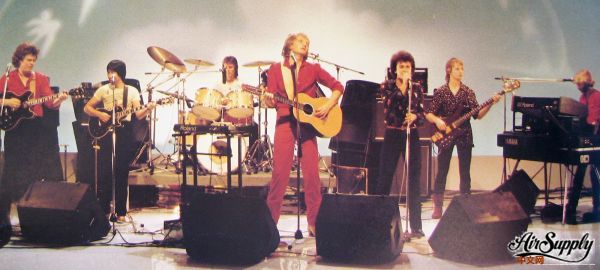
Air Supply in Japan - July, 1980
Air Supply’s popularity in Japan soared. ‘Lost In Love’ reached #4 and ‘All Out Of Love’ was #2. Arista licensed Nippon Phonogram to manufacture and promote Air Supply products in Japan. It was much easier to make a licensing deal in a foreign country than to create your own company with an expensive infrastructure. Alex Abramoff, artist relations manager for Nippon Phonogram, organized a window display contest involving retailers throughout the country. The contest ran from June 25 to July 31, and awarded prizes to stores with the most creative Air Supply window display. According to Abramoff, the promotion really paid off; “‘Lost In Love’ album, released June 25, is selling very well. At this rate, we’re hopeful to reach 50,000 in the not-too-distant future.” The entire campaign was so successful that Nippon Phonogram arranged for the band to make an in-person visit to Japan in July, which included the return of guitarist Rex Goh. A free concert took place at the Nakano Sun Plaza Hall in Tokyo for 3,000 lucky fans. In order to get a ticket a postcard had to be mailed, and 20,000 postcards were received. Nippon Phonogram lobbied for Air Supply to play a national tour later in the year. “It cost us $30,000 to bring the group and its road manager to Japan,” said Abramoff. “But we believe it was worth the expense. During the nine-day stay here, they appeared on six television shows and nine radio shows, and were interviewed by nine newspapers and magazines.”
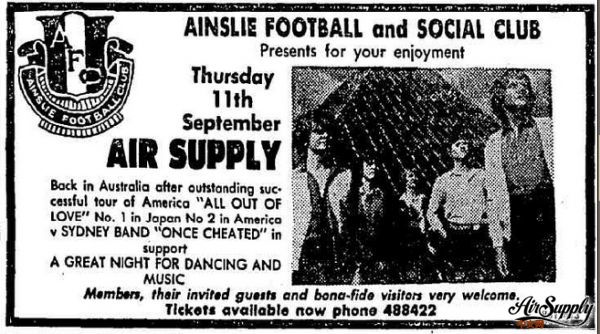
Live in Canberra - September 11, 1980
On August 31, Air Supply flew to Rio de Janeiro, Brazil, where ‘All Out Of Love’ was still #1, for a week-long promotional visit. Between Brazil and the U.S. college tour, Air Supply played a short ten-gig tour around Sydney and Canberra, mostly at clubs and colleges such as the Ainslie Football Club and the Canberra College of Advanced Education. “We’ll be spending about ten days here working, doing mainly big clubs in Sydney to get our act together, and then we’ll head to America and spend three or four days rehearsing before we hit the road,” said Russell. “Neither Graham or I are keen on long, protracted tours.”
Air Supply’s first North American tour as headliner began on October 2, 1980. It was a seven-week, 35-date tour that crisscrossed from coast to coast. The tour opened in style at the famous Perkins Palace in Pasadena (currently the Raymond Theatre), which was the highest grossing venue in L.A. during the 80s and 90s. Architecturally, the theatre was a work of art, and was used as the backdrop for the movies The Bodyguard, Spinal Tap and Pulp Fiction. “We did not know what to expect at first,” said Graham. “We had rehearsed all day for the show, but we didn’t have any presentation or anything. But we had something about us as we were green. We just came out and spoke to the audience, played the songs and they sounded exactly like the records. I guess we played safe. The crowd at Perkins Palace went nuts after the first few bars, and then we were so relaxed.”
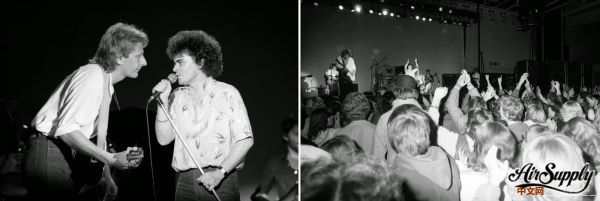
St. Cloud State University, MN - Oct. 13, 1980 (SCSU Archives)
Air Supply played 38 concerts, and all but two were completely sold out. Almost 4,000 students watched Air Supply perform at Northeast State University in Monroe, Louisiana. The largest crowd was a combined 13,000 at the State Fair in Phoenix, Arizona, where Air Supply performed twice on October 31. The band enjoyed all the benefits of being a headlining act, but the tour came to an abrupt end after Russell experienced problems with his throat. “When we first toured in 1980,” remembers Russell, “there were all these girls hanging around, and we had the attitude of ‘Hey, let’s party and get drunk every night.’ But face it, you can’t do that forever. You’ll burn out.”
“We couldn’t believe it,” said Graham. “It was like a small-scale Beatlemania. I mean, people were screaming all over the place. That first concert, we didn’t know what the American crowds were going to be like. Before the show I went out to the backstage and just stood on my own for about twenty minutes and looked at all the buses and the big trucks and all the gear going in and I thought, ‘Wow! It’s really happening.’”
Air Supply made several appearances on American television, including Johnny Carson, Merv Griffin and Dinah Shore. The American media was enamored with everything about Air Supply; the harmonies, the exotic accents, and their sudden rise to fame. When asked by Australian media when they would tour Australia again, Russell said they had no plans, and no desire to tour Australia. “We will be back in Australia for a rest over Christmas, then record in January,” he said. “After that, we will go back to the States for another tour. Touring Australia was really tiring and very boring. We’d be on a plane to go somewhere for a lunchtime gig, and then back in another city in Australia for two gigs at night. It was just terrible. So we won’t play live gigs here unless there is a specific big event for us to do. I can’t sing three shows a day anymore. I won’t because it damages my voice.”
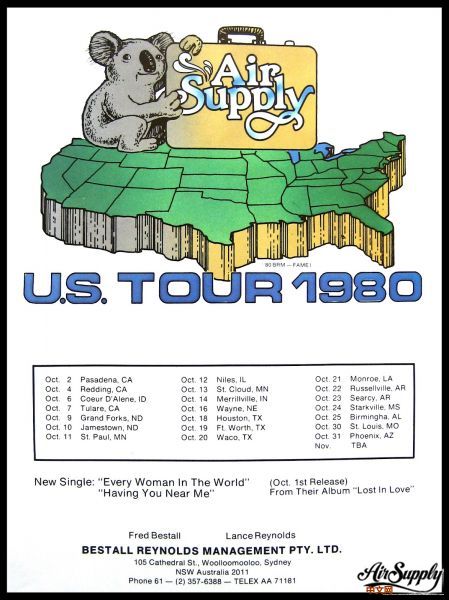
Air Supply’s four year career in Australia was a roller-coaster ride between success and failure. “They’re the most fickle fans in the world,” said Graham. “They’re with you one second, and down on you the next second. It’s so frustrating there that we’ve been on the verge of quitting a few times. You get to where you don’t see any point in trying, because you think you’re never going to get anywhere. We’ve succeeded in spite of having to work in Australia.”
Part of the problem for Air Supply was that there were very few concert halls to play in Australia, and most of those only held two or three thousand people. In order to play the largest venues, bands needed to embark on a national concert tour, which was over in two weeks. Therefore, bands were forced to play local clubs, which were not ideal for Air Supply’s type of music. “People there really like to go out and fight,” explains Russell. “They like to go out and get drunk, and get wild and crazy at the clubs. That’s very common. That’s why clubs aren’t great for us. Our ballads don’t go over well in that noisy and crazy atmosphere. With our music, we sell a lot of records to married people with kids, and they don’t go out much. Plus, to get a gold record in Australia, you only have to sell 20,000 records. And only a small part of those people who buy records go to shows.”
Rick Grossman, bass player for Divinyls, knew firsthand how tough it was to play Australia’s hotel circuit, more commonly referred to as beer barns; “It was an experience playing the outer suburban pubs where your feet stuck to the carpet and there was violence every night. Here, unlike some of the more laid-back inner-city venues, the audiences weren’t ‘cool.’ If they were into you, they showed it. Same time, if they hated you, you’d soon know about it. It was trial by fire our there. I remember we arrived for a gig at the Sundowner Hotel in Punchbowl and the place was jammed. We went to our dressing-room, changed, got ready, walked out on stage and the auditorium was now only half full. Where had the people gone? There’d been a gunfight in the car park and they’d run for their lives.”
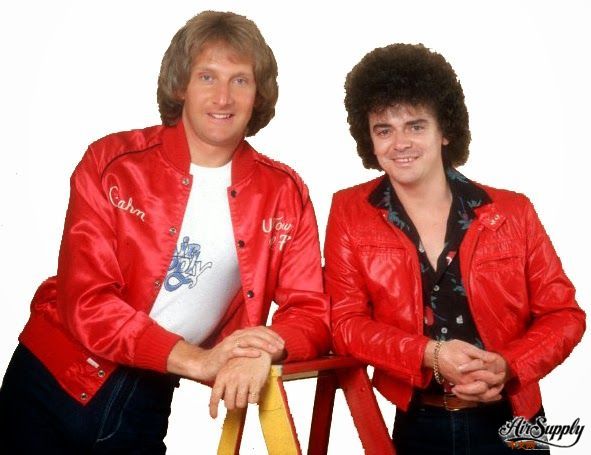
1980 U.S. College Tour Promotional Photo
While ‘All Out Of Love’ was still in the Top 10, the third single, ‘Every Woman In the World,’ debuted at #84. Arista had strongly considered releasing the album cut ‘Having You Near Me’ next, which Russell described as “another ballad and they’re the ones that seem to be working for us.” ‘Every Woman In the World’ was chosen instead, and was released on October 1, to coincide with the start of the U.S. tour. In December, it peaked at #5 on Billboard Hot 100, and remained on the chart for 17 weeks. In Australia it reached #8, one spot higher than worldwide mega-hit ‘All Out Of Love.’
‘Every Woman In the World’ was submitted to Clive Davis by Arista A&R rep Ron Silver, who was surprised it was given to Air Supply. “Once in a while, as was the case with Aretha Franklin and ‘Whatever It Is,’ Clive pitched a song I’d found for one artist to another and, in my opinion, the record was terrible,” said Silver. “Another, ‘Every Woman In the World,’ became the third hit single for [Air Supply].” Russell thought the demo for ‘Every Woman In the World’ sounded corny, so he and Graham battled Clive to not have it included on the album at all, let alone as a single. But one of the contract stipulations with Arista was that Clive picked the singles. “So it truly became a joint effort working with Air Supply,” said Davis, “taking the best songs written by Graham and finding others to be candidates for their hits. I made the same type of arrangement that I had with Barry Manilow. In this case, I could choose three outside songs per album to give them, and I really wanted to make those songs count.” ‘Every Woman In the World’ went on to become one of Air Supply’s most recognized recordings.
Upon returning to Australia, Air Supply performed ‘Every Woman In The World’ on Countdown’s final show of the year. Graham and Russell co-hosted the show with Sharon O’Neal and Tim and Neil Finn from Split Enz. Besides this appearance on Countdown, Air Supply’s return to Australia sparked very little publicity. According to Russell, since the band arrived home from the U.S., they had not been offered one concert booking in Australia. “But we don’t hold any resentment,” said Graham. “Perhaps our earlier records were not right for the Australian market at that time. It would be nice to be as recognized in Australia as we are in the U.S., if only because we live here.”
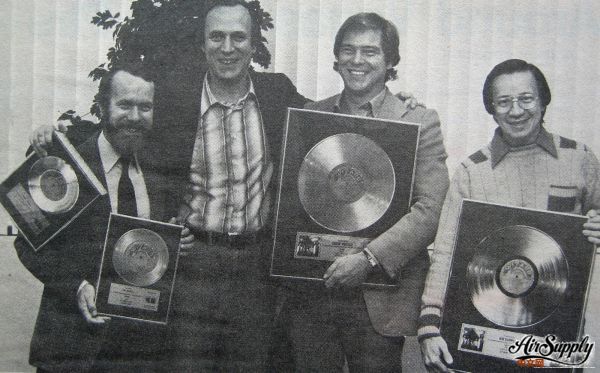
'Lost In Love' LP is Platinum in Canada - Robie Porter (2nd From Right)
In December, Billboard declared ‘Lost In Love’ the best Adult Contemporary single of the year, ahead of ‘The Rose’ by Bette Midler and ‘You’re Only Lonely’ by J.D. Souther. ‘All Out Of Love’ was certified gold after selling more than 1 million copies (2 million required for platinum). The first three Arista singles had sold more than 2 million copies, with ‘Every Woman In the World’ at #6 and still climbing. The album ‘Lost In Love’ was already platinum in Canada (100,000 copies) and the U.S. (1 million copies), and gold in Australia (20,000 copies). But Air Supply had yet to see much of the money from these sales. It was being held in trust, and was the subject of litigation between Big Time Records and Robie Porter. The legal battle was now six months old, and was to determine what percentage of the U.S. royalties each side was entitled to. “It takes time for payments to come through from the record companies,” said Russell. “I think the royalties will be more than $3.75 [per album]. I hope that they are worth more than the cost of the legal action. We will have to wait a while before we get the RolIs.”
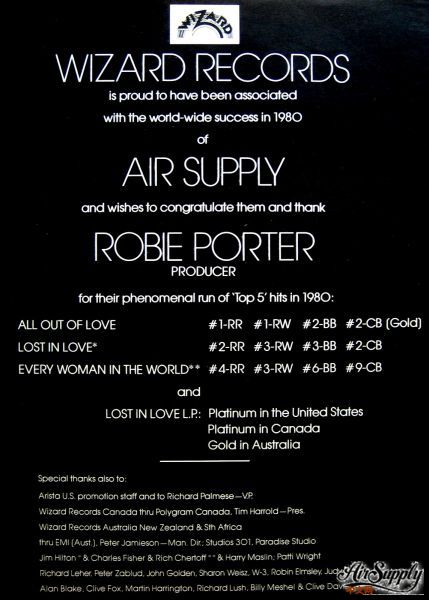
It was an amazing year for Air Supply and their management team. Eight months earlier, when Air Supply returned to Sydney in April, Lance Reynolds hosted a party for the band on the terrace garden of his penthouse, which overlooked the city lights of Sydney. That evening, Fred Bestall phoned from New York to say that Air Supply had just hit #3 in America, and were only the second Australian band to ever reach that high. The fact that Air Supply did so well in the U.S. was widely known, but even the members of the band found it hard to believe the extent of the acclaim. When drummer Ralph Cooper returned to Australia in December, he brought back a tape recording of the audience reaction because he knew no one would believe him. “It was not uncommon,” said Cooper, “to look out into the audience during ‘All Out Of Love’ to find rows of tear-stained faces. Then there was the young teenage girl who asked for an autograph and a kiss on the cheek and promptly fainted when it was delivered. The adoration felt great. I equate results with the work you put in, and we put in a lot of work, so the results were really gratifying.” |
|